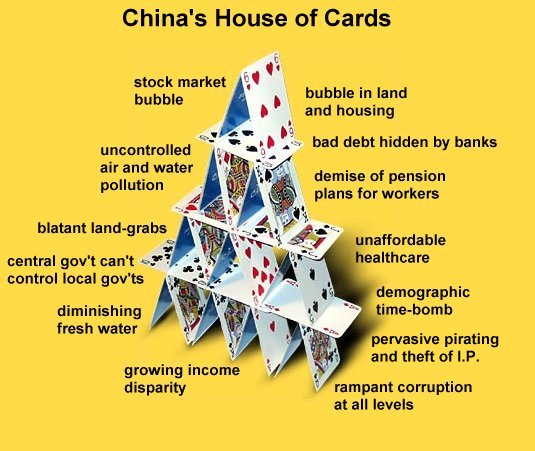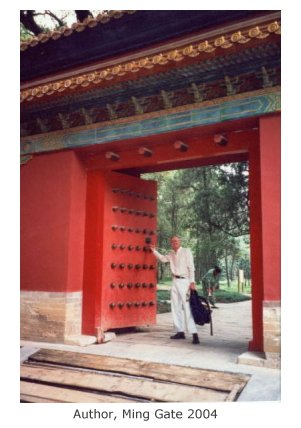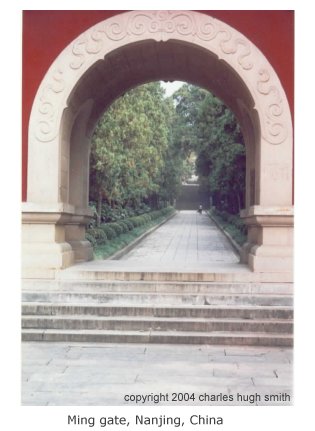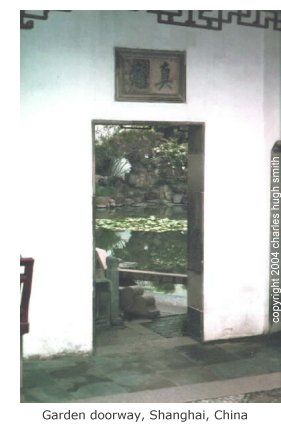

|
| weblog/wEssays archives | home | |
|
China's House of Cards (April 4, 2007) Take a look at the systemic problems facing China's leadership and tell me the "house of cards" metaphor isn't apt: 
There are so many ironies in the current frenzy to "outgrow our problems" that it's difficult to know where to begin. First off, let me say I am not a China basher. We have many, many Chinese friends and would like to see China prosper in a sustainable fashion which benefited all of her 1.2 billion people. But that's not what's happening, nor shaping up to happen. Instead, the list of extremely-difficult-to-solve problems just keeps growing. Just touching on the fundamentals: Marxist theory is built on the central contradictions of Capitalism: that monopoly capital creates business cycle extremes which will threaten the entire system, and that even as capital eliminates competitors, it keeps labor costs low by forcing labor to compete against itself.  Despite labor and financial regulations which have taken the edge off the worst of
capitalism's excesses (at least until recently), much of what Marx identified remains
largely correct: Capital will seek to eliminate competition to gain pricing power
via monopolies or trusts, and labor remains in competition with lower-cost providers of
labor unless protected by a government-sanctioned labor version of monopoly, i.e. unions.
Despite labor and financial regulations which have taken the edge off the worst of
capitalism's excesses (at least until recently), much of what Marx identified remains
largely correct: Capital will seek to eliminate competition to gain pricing power
via monopolies or trusts, and labor remains in competition with lower-cost providers of
labor unless protected by a government-sanctioned labor version of monopoly, i.e. unions.
But the Chinese Communist Party has its own key contradictions. In a one-party state, oversight is inherently weak, for those in power can always squelch any oversight which threatens to limit their benefits or prerogatives. Without oversight and other balancing centers of power, then corruption, mismanagement and mis-allocation of capital are permanent features of any one-party society and economy. Thus we have the four central banks of China hiding hundreds of billions in bad debt, loans which were issued to government-owned businesses to keep them afloat despite the corruption and bad management which bankrupted them. Why did the government do this? To offload the workers' pensions and medical care onto something other than the Party or central government. As the government has slowly closed the worst, most underperforming state-owned industries, the workers are being left with no safety net--no pensions or healthcare benefits. For Chinese workers, they now have the worst of both worlds. They have the limited education and opportunities of a systemically corrupt Communist society, and high "free-market" costs for medical care. Thus you read stories of young women offering to sell themselves on the Internet as a way to pay for their mother's operation. Scams? Maybe. But the problem is real: medical care in China is now unaffordable. The days of the barefoot doctors are long past.  I have covered the environmental threats caused largely by this lack of oversight at
length in previous posts. (see "Unfolding Crises: Asia" in
2007 archives and
2005-2006 archives
and China: An Interim Report.)
I have covered the environmental threats caused largely by this lack of oversight at
length in previous posts. (see "Unfolding Crises: Asia" in
2007 archives and
2005-2006 archives
and China: An Interim Report.)
As global temperatures rise, China's rainfall seems to be decreasing, even as its major rivers are tapped for increasing industrial useage. Water shortages are a non-trivial issue for China, which the leadership is attempting to solve by constructing a multi-billion dollar canal from the water-rich south to the water-poor north. Does this create more water, or just lead to future shortages in the south? Frequent contributor Paul M. sent in a link to a New York Times article on Chinese demographics, and how its economy will be affected: (free registration required) China Scrambles for Stability as Its Workers Age Recall that one of Chairman Mao's most long-term legacies is the demographic time bomb he created by encouraging Chinese families to have 4 or 5 children in the 50s. As the population exploded from 600 million to a billion, the leadership realized that a catastrophe was looming, as China could not feed a future population of 2 billion people. So they instituted a "one child" policy (now being loosened) which has created an entire generation of offspring with no brothers, sisters, cousins, aunts or uncles--no family beyond their parents. This is truly a bizarre society, especially in such a family-centric culture such as China's. The upshot is rather obvious: a small generation of workers is now supposed to supposed to support a much larger aging generation. Paul's comments are right on the mark: Well, if the premise of the article is valid, and China is as important to the world economy as many folks believe, then what next when two Chinese workers are supporting four Chinese retired parents? It kind of makes our Social Security problems look like a walk in the park.  Long-time correspondent Albert T. sent in a link to a real eye-opener from the BBC:
Only half Chinese speak Mandarin. The value of this piece is to remind us in the
West that China doesn't just face the usual industrial ills of pollution and wage
disparity; it is a huge, very poor country with hundreds of millions of subsistance-farmer,
geographically isolated and poorly edcated rural citizens.
Long-time correspondent Albert T. sent in a link to a real eye-opener from the BBC:
Only half Chinese speak Mandarin. The value of this piece is to remind us in the
West that China doesn't just face the usual industrial ills of pollution and wage
disparity; it is a huge, very poor country with hundreds of millions of subsistance-farmer,
geographically isolated and poorly edcated rural citizens.
The bottom line: can China generate enough wealth, and manage it wisely enough, to construct a sustainable economy and social safety net before its ills overwhelm it? In other words: can China leapfrog pollution and waste and build an infrastructure which supplies clean water to all its citizens while it has the money to do so? Can it fund a pension system to provide for its vast baby Boom generation while capital is still flowing and profits are being made? I think the short answer is "no" because of the horrendous mis-allocation of capital and resources. Regional and local governments are building vast sports arenas, civic centers, business parks, luxury condos and other high-profile projects on the theory that "if we build it, they will come"--hope rather than real business plans or projections. Meanwhile, new water-treatment plants are often offline due to poor or non-existent maintenance. These conditions are not rarities in China--they are the norm. Ditto for the pervasive pirating of goods and the theft of intellectural property. I personally know of large Western pharmaceutical plants which have been permanently shuttered by their foreign owners due to the pirating/marketing of worthless 'copycat' pills sold under perfect replicas of the company's labeling. Though we hear most often about software and films, knock-offs of name-brand motorcycles and many other goods are ubiquitous. Pirating is not an occasional condition, it is the norm. The excuse is that this happens in all developing countries but it wasn't pervasive in Korea and Japan in their rise to industrial wealth.  One huge fly in the ointment for the cheerleaders is the central government's lack
of control of local governments. While the central government can order certain
things by fiat--leaded gasoline is gone as of next week, all citizens will wear surgical
masks outdoors, etc.--its control over the local government's allocation of land and
capital is severely limited.
One huge fly in the ointment for the cheerleaders is the central government's lack
of control of local governments. While the central government can order certain
things by fiat--leaded gasoline is gone as of next week, all citizens will wear surgical
masks outdoors, etc.--its control over the local government's allocation of land and
capital is severely limited.
Thus we have local governments ignoring central government rules on pollution, land grants, industrial production, lending--you name it. The net result: local governments and their financial partners are mismanaging China's resources, financial assets and environment on a staggering scale. My point here is: China is supposedly the golden investment of the century, the industrializing power that will pull the rest of the world to prosperity. But the evidence suggests China's run is about over. As the bubbles in China's stock markets and real estate blow up, so will foreign investment and other forms of speculative borrowing and investment. As domestic sales slow, the dream of every capitalist in the entire world--to sell to China's 1.2 billion residents--will fade. I fear that China has mismanaged its one "industrializing power" shot of surplus capital. Once speculative money dries up, so will profits and taxes, and China may well be left with the costs of rampant industrialization, systemic corruption and mismanagement of financial and natural resources and precious little of the benefits which appeared, for one brief 20-year stretch, to be permanent and without limits. For more on this subject and a wide array of other topics, please visit my weblog. copyright © 2007 Charles Hugh Smith. All rights reserved in all media. I would be honored if you linked this wEssay to your site, or printed a copy for your own use. |
||
| weblog/wEssays | home |